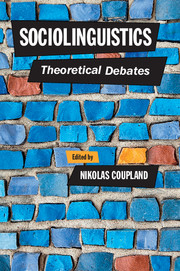Book contents
- Frontmatter
- Contents
- List of contributors
- Preface and acknowledgements
- 1 Introduction: Sociolinguistic theory and the practice of sociolinguistics
- Part I Theorising social meaning
- Part II Language, markets and materiality
- 6 Treating language as an economic resource: Discourse, data and debate
- 7 Theorising the market in sociolinguistics
- 8 Embodied sociolinguistics
- Part III Sociolinguistics, place and mobility
- Part IV Power, mediation and critical sociolinguistics
- Part V Sociolinguistics, contexts and impact
- Part VI The evolution of sociolinguistic theory
- Index
- References
6 - Treating language as an economic resource: Discourse, data and debate
from Part II - Language, markets and materiality
Published online by Cambridge University Press: 05 June 2016
- Frontmatter
- Contents
- List of contributors
- Preface and acknowledgements
- 1 Introduction: Sociolinguistic theory and the practice of sociolinguistics
- Part I Theorising social meaning
- Part II Language, markets and materiality
- 6 Treating language as an economic resource: Discourse, data and debate
- 7 Theorising the market in sociolinguistics
- 8 Embodied sociolinguistics
- Part III Sociolinguistics, place and mobility
- Part IV Power, mediation and critical sociolinguistics
- Part V Sociolinguistics, contexts and impact
- Part VI The evolution of sociolinguistic theory
- Index
- References
Summary
Can language be a commodity?
In recent years, along with other colleagues, we have developed arguments that language is increasingly treated as a commodity in late capitalism (Tan and Rubdy 2008; Heller 2010; Duchêne and Heller 2012; Park and Wee 2012). This argument has been the subject of three major types of critique: The first comes from linguistic minority theorists, the second from the field of “language economics,” and the third from Marxist approaches to language and commodification. We begin by briefly summarizing our argument and by making explicit the assumptions behind it, specifically those that orient us to the material we discuss in ways which differ from those of our critics (rendering straightforward ‘debate’ actually quite difficult). We conclude with a discussion of how the consideration of whether language (or, as we prefer to say, communicative resources) can be commodified opens questions for further research.
We should begin by saying that one thing that frequently arises as an issue in these debates is what idea of language underlies them. We draw on Bourdieu (1982) to argue that language can be understood as a social practice that consists of circulating communicative resources. Those resources are modes of meaning-making that include social organization and therefore lie at the heart of the ways in which the social, cultural, political, and economic are inherently intertwined. Having said that, we need to recognize that the processes of commodification we claim to observe usually are based on a quite different idea of what language is; namely, they draw on the idea of language as an autonomous system that can be constructed both as an emblem of authentic identity and as a technical skill – an idea that crystallized around industrial capitalism and its connection to the nation-state (Heller 2007). Our critics, as we shall see, themselves grapple with the question of the ontological status of language, albeit not necessarily from the same position as each other or from the position that we authors adopt.
The next section details how our ideas about linguistic commodification emerged in an attempt to account for phenomena we saw emerging as we were looking at something else.
- Type
- Chapter
- Information
- SociolinguisticsTheoretical Debates, pp. 139 - 156Publisher: Cambridge University PressPrint publication year: 2016
References
- 56
- Cited by



